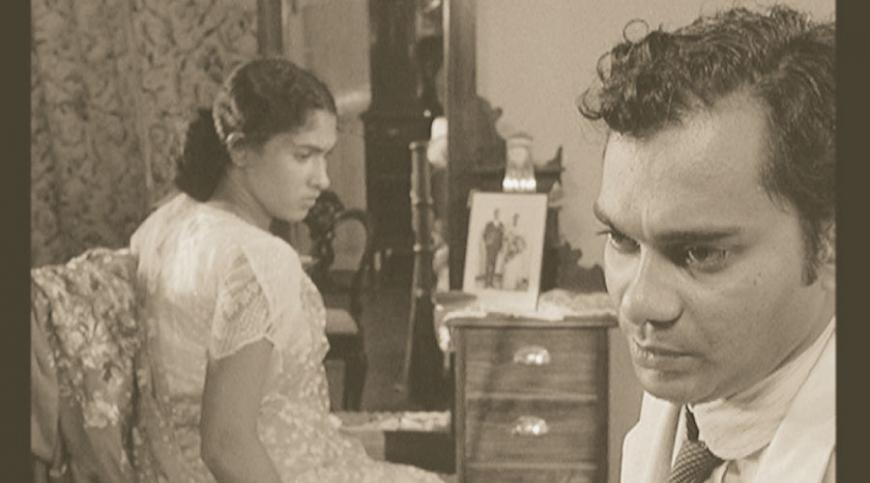
 The film adaptation of Martin Wickremasinghe’s novel Gamperaliya (Transformation of the Village) is directed by Dr. Lester James Peries and the screenplay is by Dr. Tissa Abeysekara. It features a brilliant cast with David Dharmakeerthi as Kaisaruwaththe Muhandiram, Shanthi Lekha as Matara Hamine, Henry Jayasena as Piyal, Punya Heendeniya as Nanda, Gamini Fonseka as Jinadasa, Trilicia Gunawardene as Anula and Wickrema Bogoda as Tissa.
The film adaptation of Martin Wickremasinghe’s novel Gamperaliya (Transformation of the Village) is directed by Dr. Lester James Peries and the screenplay is by Dr. Tissa Abeysekara. It features a brilliant cast with David Dharmakeerthi as Kaisaruwaththe Muhandiram, Shanthi Lekha as Matara Hamine, Henry Jayasena as Piyal, Punya Heendeniya as Nanda, Gamini Fonseka as Jinadasa, Trilicia Gunawardene as Anula and Wickrema Bogoda as Tissa.
The film is set in the early 1940s and begins in the village of Koggala in the Galle District in the Southern Province of British Ceylon during the Sinhala Avuruddha. The opening sequence of the film shows Nanda, a young woman who belongs to an upper class Sinhalese family being taught English by Piyal who is a young man from a lower social class. Nanda and Piyal are in love and Piyal has given Nanda love letters to which she has not replied because of her social inhibitions. Nanda invites Piyal to the Avurudu celebrations at her home, the Mahagedara, where Piyal asks her for a reply to his letters and Nanda tells him that she cannot reply.
Nanda breaks off her relationship with Piyal because her parents are strongly against it because of Piyal’s lower class status and the heartbroken Piyal leaves Koggala for Colombo, after which Nanda is struck with a strange illness. Nanda is the favourite child of her father Kaisaruwaththe Muhandiram and he spends a lot of money on her illness and she is cured. Nanda is then married off to Jinadasa Lamahewa who is from the same social class as her, and she gives birth to a baby boy who dies shortly after child birth. Jinadasa is unemployed and in financial difficulty and he decides to move to another town in search of a job. Nanda is unhappy about Jinadasa leaving but she does not stand in his way. Jinadasa writes to Nanda at the beginning but she stops hearing from him after some time.
Meanwhile, Piyal has established himself in a job in Colombo but has refused many marriage proposals because he has not forgotten Nanda. Piyal meets Nanda and her elder sister Anula and their mother Matara Hamine by chance at the village temple on a Poya day while on a short visit to Koggala. Piyal begins to visit the Mahagedara frequently during Jinadasa’s absence and invites Matara Hamine, Anula and Nanda on a pilgrimage for a Poojawa at the Paragoda Viharaya. Nanda is initially reluctant to go but she goes to Paragoda nevertheless and remembers her husband Jinadasa from whom she has not heard of for years. Nanda falls ill after the trip to Paragoda and admits to Anula that she loves Piyal and that a few days after the trip to Paragoda, Piyal made an uncouth proposal that she comes and lives with him even though she is still technically married to Jinadasa and she refused.
Later on in the film, Nanda receives information that Jinadasa has passed away and she marries Piyal. Shortly after Nanda’s marriage to Piyal, a telegram from a hospital in Rathnapura is sent to the Mahagedara in Koggala to inform Nanda that her husband is seriously ill.
Anula reads the telegram and rushes to Colombo to inform Nanda who is confused because Piyal told her that he was going to Diyathalawa but she goes to the Rathnapura hospital with Piyal’s mother and finds out that it is not Piyal but Jinadasa who has died, and the previous information she received about Jinadasa’s death was false.
When Piyal comes home, Nanda tells him that she cannot forget Jinadasa which makes Piyal very angry and he shouts at her. But Piyal immediately apologises to Nanda and he confesses to her that he knew Jinadasa was alive about two months after their marriage but he could not bring himself to reveal it to her, and they make up and the film ends on this happy note.
Gamperaliya by Martin Wickremasinghe is a brilliant novel in Sinhala literature, which has been made into an equally brilliant and award winning film by Dr. Lester James Peries which explores the changes in village culture that is influenced by Modernisation and Westernisation.
The film stays true to the novel and explores the themes of social change, class hierarchy, love, memory, time, inter-personal relationships and an individual’s relationship with society. Both the novel and the film send the powerful message that social change is inevitable and people have to change with the times, and if they stubbornly hold onto ancient traditions that are no longer relevant in the changing, modern era, they will have to face disastrous consequences which are made evident by the tragedy and heartache caused in the lives of Nanda, Piyal and Jinadasa.
The film is brilliantly adapted and directed by Dr. Lester James Peries and the screenplay is beautifully written in eloquent Sinhala by Dr. Tissa Abeysekara, and the actors David Dharmakeerthi, Shanthi Lekha, Henry Jayasena, Punya Heendeniya, Gamini Fonseka, Trilicia Gunawardene and Wickrema Bogoda give excellent, subtly nuanced performances.
